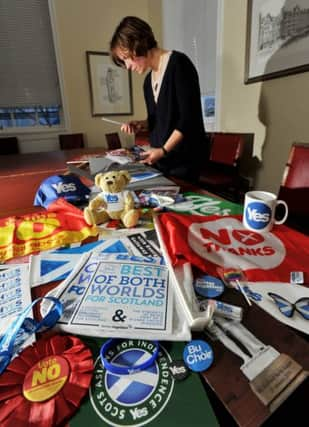Kirsty Gunn: Indyref2 discussion is doomed to be disaster of dumbing-down drivel


I can’t be the only one who’s been concerned, ever since 2014, about the debasing of a complicated historical and national issue by the frame of reference used to describe it. Reducing the last Scottish Referendum campaign to the emotionally-charged binary option of “Yes!” or “No” not only set the tone for the “Leave” or “Remain” thinking that skewed the pitch two years later but served to cut off further and more productive lines of inquiry around what surely must be one of the most important political decisions an electorate could make.
Yet “Yes” and “No” it was, and though “no” said “no”, now we’re to have another round of exactly the same sort of ludicrous back-and-forth excuse for a discussion so that, the SNP hope, “no” can get changed into “yes” and “yes” can have its way.
Advertisement
Hide AdAdvertisement
Hide AdAnd language, yes, is at the heart of the thing. For Theresa May is going to have to do a whole lot better than using a condolence card adjective or two to persuade Scottish voters that the Union is a good idea. And we badly need some good ideas now. We need to be educated and tested and made to consider why such a decision makes sense, don’t we? Not just be served up some kind of smug, self-righteous conservatism that patronises even her pro-Union constituency and only underlines how remote Westminster is from Holyrood. Give us some reasons now, please, especially now, why thinking about having another referendum off the back of a hard, hard Brexit might not a good idea. Surely it has never been more important for the Conservative and Labour parties to get their act together and start thinking about the phrases and words and metaphors that might help us consider the options and alternatives to the strident voice that, while it might be grindingly single-mindedly fixed to one note only – independence, independence independence – is effectively drowning out all others.
Where are the Labour and Tory and Liberal think tanks when you need them? Where are the experts? The commentators? Why aren’t our historians and social philosophers being invited onto radio and television channels to suggest why, no matter how unhappy we are about the current political situation in the UK, “indyref2” with all its massive costs and predations upon politicians’ time and functions could waste time and money better spent on fighting poverty and improving our primary education, say? Why aren’t those who aren’t in thrall to independence at all costs not using the ideas of those with expertise and economic wisdom and social understanding to assist them in conveying a message that is open to the complications and spectrum-thinking of an intelligent population who don’t actually, for the most part, want to paint their faces blue and wrap themselves up in a Saltire flag? Where are the words, the sentences, the phrases that might help us understand a variety of concepts and options when it comes to teasing apart the tricky issue of one country in the United Kingdom wanting to be part of Europe and her neighbour, who she depends on, not?
Yet all we’ve got instead, looming on the horizon like a giant zeppelin with “Yes!” again written all over it, is another referendum. “Referendum”. It’s another of those very simple words that masks and dissipates anything complex, obliterates it in fact. It signifies, “referendum” does, supposedly, a brand new world were everything will be lovely if only “the people” can get to speak. A word that treats us all as though we’re a bunch of gullible twits who should feel lucky to be able to express our desires on a ballot paper in the illiterate’s mark of a tick or cross.
Crikey. How I am dreading it already. The condescension. The rhetoric. The proliferation of the kind of terminology that belongs in a Janet and John reader – “We’re all off to a Referendum!” – to make us feel, what? Excited about having our “voices heard” as the politicians keep saying? When really, all a referendum describes is the complete breakdown of parliamentary democracy and a failure of the normal, sanctioned decision-making processes.
For we shouldn’t need to have referendums, should we? Our elected politicians, in full-time jobs as politicians, with all the information and statistics to hand that we, with our own jobs, don’t have time to read through and quantify.... They’re supposed to be doing that job for us. And we can’t rely on them anyway, can we, the referendums, to deliver the right result? The last referendum was a farce – almost literally so, a pantomime dreamed up by members of an Oxford debating and theatricals club that morphed into a spat in the House of Commons and became, horribly, played out on a national stage...Look where that referendum got us. We can’t hope “the people” will speak for us. “People” are too busy working and bringing up their families and trying to make ends meet. And besides, not all of us want to be “the people” anyway. We want to be individuals who have informed, reasonable, interesting debate. We want the language to match and the politicians to step up to the plate.
We, “the people” are really just you and me.